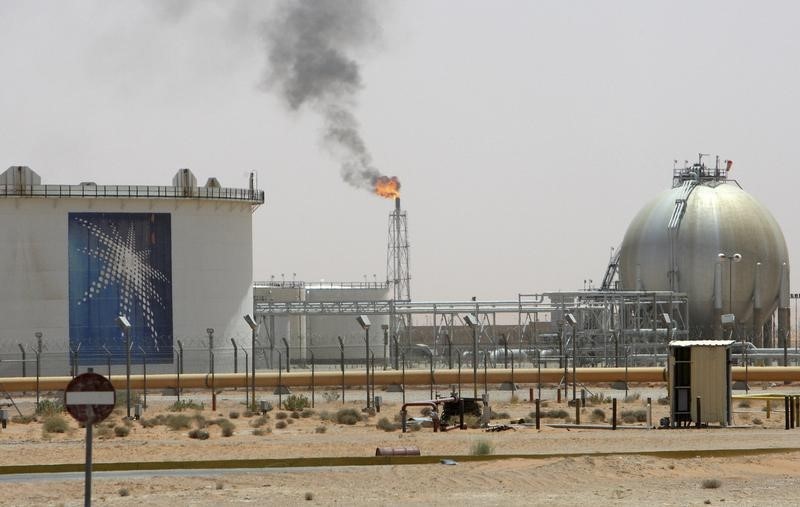(Bloomberg) -- Saudi Arabia expects oil revenue to jump about 80 percent by 2023 to help the kingdom record its first budget surplus in a decade, according to people with knowledge of the matter.
Under a six-year program to balance the budget, officials predict rising oil prices and output will push income from oil sales to 801.4 billion riyals ($214 billion) from 440 billion riyals this year, the people said on condition of anonymity because they aren’t authorized to share the data publicly. It assumes the price of oil will reach $75 a barrel. Non-oil revenue, excluding income from the Public Investment Fund, would increase 32 percent to 337 billion riyals, they said.
While Crown Prince Mohammed bin Salman’s plan to transform the economy aims to reduce its reliance on oil in the long term, higher crude prices are central to efforts to support growth while introducing measures that would help boost revenue from other sources. The kingdom has led a drive among major non-OPEC members to stabilize oil markets through production cuts that have helped Brent crude prices exceed $60 a barrel.
Authorities expect oil production to increase from an average of 10 million barrels a day this year to 11.03 million barrels in 2023. For 2020, they predict output of 10.45 million barrels a day, generating 605 billion riyals in revenue, the people said.
The Ministry of Finance declined to comment.
The scenario may signal that the world’s biggest oil exporter doesn’t currently see a need to extend the agreement to cut production beyond 2018 as a global supply glut eases.
Easing austerity “could prove premature if oil prices disappoint,” Jean-Michel Saliba, an economist at BofA Merrill Lynch in London, wrote in a report last week. “Energy policy is likely to remain focused on supporting the oil market rebalancing and enabling the government’s shift to boost growth near-term.”
Top Saudi officials last week rolled out an expansionary budget for 2018 to revive an economy battered by austerity and low oil prices. Gross domestic product contracted 0.5 percent in 2017.
A document outlining some details of the fiscal program and published by the Saudi Press Agency showed authorities expected non-oil economic growth to stay above 3 percent through 2020 from 1.5 percent this year. The document has since been deleted from the agency’s website.
| (Figures in billions of riyals) | 2017 | 2018 | 2019 | 2020 | 2021 | 2022 | 2023 |
|---|---|---|---|---|---|---|---|
| Government revenue | 696 | 783 | 843 | 909 | 955 | 1,049 | 1,138 |
| Government spending | 926 | 978 | 1,006 | 1,050 | 1,080 | 1,107 | 1,134 |
| Public debt | 438 | 555 | 673 | 749 | 805 | 854 | 854 |
| Government Reserves at SAMA | 584 | 456 | 411 | 345 | 276 | 267 | 271 |
Source: Saudi Ministry of Finance
Economy Minister Mohammad Al Tuwaijri, speaking after the budget release on Tuesday, said that the kingdom “found it appropriate to move to a more optimistic scenario” in fiscal planning. “We’re very satisfied with what happened in 2017, and we’ll continue on this journey.”
The budget deficit narrowed to about 9 percent of GDP this year.
| 2016 | 2017 | 2018 | 2019 | 2020 | |
|---|---|---|---|---|---|
| GDP growth (%) 1.7 | -0.5 | 2.7 | 2.7 | 2.8 | |
| Non-oil GDP growth (%) 0.2 | 1.5 | 3.7 | 3.1 | 3.2 |
Source: Ministry of Economy and Planning, General Statistics Authority
Other details from the document include:
- Unemployment among Saudis to drop to 10.6 percent in 2020 from 12.6 percent in 2017
- Total tax revenue to reach 189 billion riyals in 2020 from 97 billion riyals
